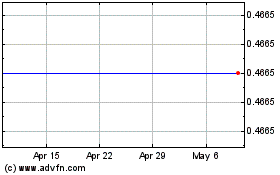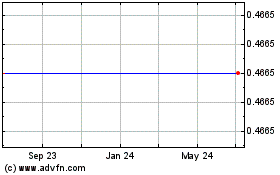FDA Panel Recommends More Stringent Clinical Trials For Obesity Drugs
March 29 2012 - 5:40PM
Dow Jones News
A Food and Drug Administration panel Thursday recommended more
stringent clinical trials for obesity drugs to better assess heart
risks.
The FDA convened a two-day advisory committee meeting to discuss
the development of weight-loss drugs and whether the agency should
require longer studies that are specifically designed to look at
whether the products might increase the risks of heart attacks and
strokes.
The development of obesity compounds has been a tough area for
companies since the fen-phen drug combination was taken off the
U.S. market in 1997, after one of the medication's components was
linked to heart-valve damage.
Abbott Laboratories removed its weight-loss drug Meridia from
the U.S. market in 2010 amid concerns about the drug's risk of side
effects such as heart attack and stroke.
The FDA hasn't approved a new weight-loss drug in more than a
decade, although the agency may soon approve Vivus Inc.'s (VVUS)
Qnexa, which was endorsed, 20-2,by a similar advisory panel last
month.
For now, Roche Holding AG's (ROG.VX) Xenical is the only
long-term prescription weight-loss drug on the market, though it
hasn't gained wide usage partly because of gastrointestinal side
effects. The approval of Qnexa and two other weight-loss drugs has
been held up for a variety of safety concerns, including whether
the risk of heart problems is increased.
Current weight-loss drug development guidelines recommend
studies of at least a year in overweight people to show whether
people lose weight compared to patients in a placebo group and to
look at whether there are any drug side-effects including changes
in heart rate or blood pressure. But, the duration and size of most
studies aren't able to show whether the drugs actually raise the
risk of heart attacks and strokes.
The panel recommended that drug makers include heavier, older
and sicker patients, or those at higher risk of having heart
problems, in clinical studies. Often, people with a history of
heart problems are excluded from initial studies. The panel also
recommended, on a 17-6 vote, that experimental weight-loss drugs be
required to show they don't increase the risk of heart attacks and
strokes even if they don't have a signal for potential risk such as
an increase in heart rate in initial, early-stage studies.
In 2008, the FDA toughened guidelines for diabetes drugs and now
requires preapproval studies of two years that are designed to look
at whether potential diabetes drugs increase heart-attack risks
after safety questions were raised about GlaxoSmithKline PLC's
(GSK, GSK.LN) diabetes drug Avandia. Access to that drug is
severely restricted in the U.S. The FDA is considering whether to
adopt similar guidelines for drugs to treat obesity.
-By Jennifer Corbett Dooren, Dow Jones Newswires; 202-365-5521;
jennifer.corbett@dowjones.com
VIVUS (NASDAQ:VVUS)
Historical Stock Chart
From Mar 2024 to Apr 2024

VIVUS (NASDAQ:VVUS)
Historical Stock Chart
From Apr 2023 to Apr 2024
